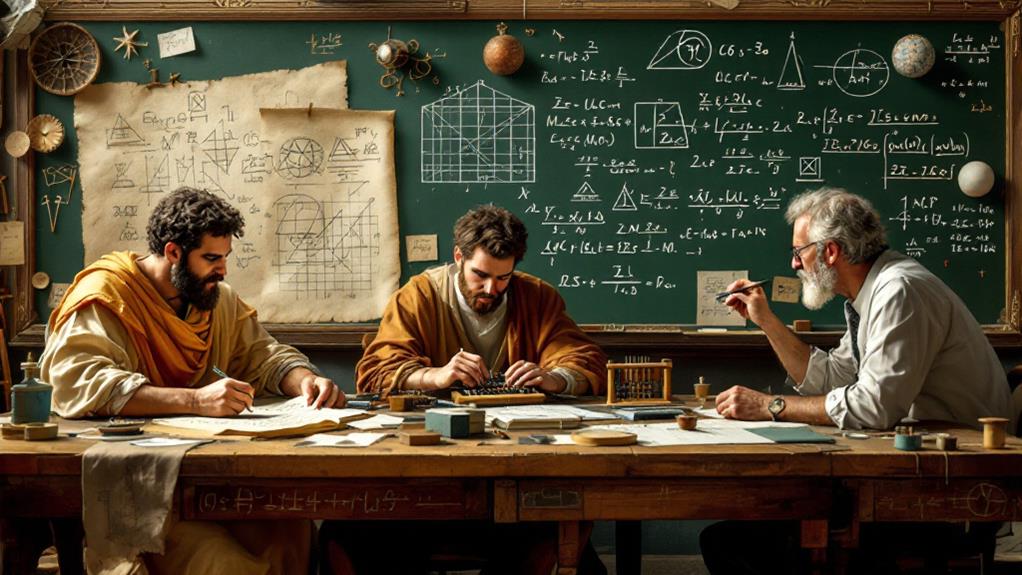The History of Mathematics: From Ancient Calculations to Modern Theories

Mathematics has evolved dramatically over millennia. You'll find its origins in ancient civilizations, where practical needs drove early calculations. The Greeks altered math with abstract thinking and meticulous proofs, while the Islamic Golden Age saw advancements in algebra and trigonometry. During the Renaissance and Scientific Revolution, math became intertwined with physics and astronomy. Modern mathematics emerged in the 18th and 19th centuries, formalizing concepts and branching into new fields. Today, math shapes our understanding of the universe, from quantum mechanics to cosmology. As you investigate further, you'll uncover the deep impact of mathematical thinking on human knowledge and progress.
Ancient Mathematical Systems
One can trace the origins of mathematics back to ancient civilizations that developed their own unique systems. You'll find that some of the earliest mathematical concepts emerged in Mesopotamia and Egypt, where practical needs drove innovation.
The Babylonian number system, based on a sexagesimal (base-60) structure, was remarkably advanced for its time. You'd be surprised to learn that this system allowed for complex calculations and even rudimentary algebra. It's still reflected today in how we measure time and angles.
Egyptian mathematics, on the other hand, focused heavily on geometry. You'll see evidence of their proficiency in the precise construction of pyramids and other monumental structures. They developed methods for calculating areas and volumes, which laid the groundwork for later geometric principles.
As you investigate these ancient systems, you'll notice they weren't just theoretical. They were practical tools used for trade, architecture, and astronomy. The Babylonians' clay tablets and Egyptians' papyrus scrolls reveal a rich fabric of mathematical thought that would influence future civilizations. These early systems set the stage for the more abstract mathematics that would follow in Greece and beyond.
Greek Contributions to Mathematics
Greece's golden age of mathematics ushered in a novel phase of abstract thinking and rigorous proof. You'll find that Greek mathematicians made pioneering contributions that still shape our understanding of mathematics today.
One of the most famous Greek mathematical discoveries is the Pythagorean theorem. Attributed to Pythagoras, this fundamental principle relates the sides of a right triangle. It's a cornerstone of trigonometry and has applications in various fields, from architecture to physics.
Euclidean geometry, developed by Euclid in his work "Elements," revolutionized mathematical reasoning. You'll recognize its influence in the axiomatic method, where complex theorems are derived from simple, self-evident truths. This approach laid the foundation for modern mathematical proofs.
Greek mathematicians also made significant advances in number theory, algebra, and calculus. They investigated concepts like irrational numbers, conic sections, and the method of exhaustion. You'll see their influence in the works of later mathematicians, including Newton and Leibniz.
The Greeks' emphasis on logic and deductive reasoning transformed mathematics from a practical tool into a rigorous discipline. Their contributions continue to shape how you learn and apply mathematics today.
Islamic Golden Age Mathematics

Following the Greek golden age, mathematics flourished during the Islamic Golden Age. This period, spanning from the 8th to the 14th centuries, saw significant advancements in algebra and developments in trigonometry. Muslim mathematicians built upon earlier works and made transformative contributions to the field.
You'll find that algebra took center stage during this era. Al-Khwarizmi, often called the "father of algebra," introduced systematic solutions for linear and quadratic equations. His work laid the foundation for modern algebraic notation and methods.
In trigonometry, Islamic scholars made remarkable progress. They developed the sine, cosine, and tangent functions, which are still essential in mathematics today. You'll notice that these advancements were vital for astronomy and navigation.
The Islamic Golden Age also saw the introduction of decimal fractions and the concept of zero as a placeholder. These innovations revolutionized mathematical calculations and paved the way for future developments.
As you investigate this period, you'll uncover that Islamic mathematicians' contributions were instrumental in bridging ancient Greek mathematics with the Renaissance era, shaping the course of mathematical history.
Renaissance and Scientific Revolution
The Renaissance and Scientific Revolution marked a new chapter in mathematics, building upon the foundations laid during the Islamic Golden Age. You'll find that this period of intellectual ferment, spanning roughly from the 14th to 17th centuries, saw a surge in mathematical innovations that would shape the future of the field.
During the Renaissance, you'd have witnessed the revival of classical Greek mathematics, with scholars rediscovering and translating ancient texts. This renewed interest sparked fresh approaches to mathematical problems. You'd have seen the development of symbolic algebra by François Viète, revolutionizing how mathematicians expressed and solved equations.
The Scientific Revolution brought mathematics and natural philosophy closer together. You'd have marveled at Galileo Galilei's use of mathematics to describe physical phenomena, laying the groundwork for modern physics. René Descartes' invention of analytic geometry would've caught your eye, unifying algebra and geometry in a way that opened new avenues for exploration.
Isaac Newton and Gottfried Leibniz's development of calculus stands out as a crowning achievement of this era, providing powerful tools for analyzing change and motion. These advancements set the stage for the rapid progress in mathematics that followed.
Birth of Modern Mathematics

As the Scientific Revolution paved the way for new mathematical frontiers, the 18th and 19th centuries witnessed the birth of modern mathematics. You'll find this period marked by groundbreaking discoveries and the formalization of mathematical concepts.
The development of calculus by Newton and Leibniz revolutionized mathematics, providing tools to study motion and change. You'll see how this powerful method influenced physics, engineering, and economics. The formalization of logic, led by mathematicians like George Boole, laid the foundation for modern computer science and artificial intelligence.
During this era, you'll encounter several key advancements:
- The emergence of abstract algebra
- The development of non-Euclidean geometries
- The rigorous study of infinite series and limits
- The birth of probability theory
These innovations transformed mathematics from a tool for practical problem-solving into a rich, abstract discipline. You'll notice mathematicians becoming more concerned with proving theorems and establishing rigorous foundations for their work. This shift towards abstraction and formalism would continue to shape mathematics throughout the 20th century, leading to new branches of study and deepening our understanding of the mathematical universe.
Contemporary Mathematical Advancements
From out of the 20th century emerged a fresh chapter of mathematical innovation, propelling the field into uncharted territories. You'll find that contemporary mathematics has expanded exponentially, with new branches and applications emerging at an unparalleled rate.
One of the most impactful developments you'll encounter is the integration of mathematics with computer science. This fusion has led to groundbreaking artificial intelligence applications, revolutionizing fields like machine learning, data analysis, and predictive modeling. You're now witnessing how algorithms and mathematical models power everything from self-driving cars to personalized recommendation systems.
Cryptography advancements have also taken center stage in modern mathematics. You'll see how complex mathematical theories are being applied to secure digital communications, protect sensitive data, and enable secure online transactions. These advancements have become essential in our increasingly interconnected world.
Moreover, you'll notice that contemporary mathematics has made considerable progress in areas like topology, chaos theory, and quantum computing. These fields are pushing the boundaries of our understanding of space, time, and the fundamental nature of reality. As you delve deeper, you'll discover how mathematics continues to evolve, shaping our world in ways we're only beginning to comprehend.



